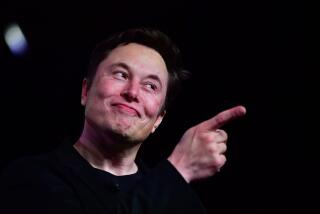Biography Zooms In on Talents and Flaws of Steve Jobs
- Share via
At 30, Steve Jobs, founder and visionary of Apple Computer, was stripped of power in the company but was still worth $100 million--a virtually unemployed high-tech millionaire before it was fashionable.
Embittered and determined to prove that his success was no fluke, Jobs sold his stock and struck out on his own to found Next, the computer company he hoped would eclipse Apple and become a testament to his true genius.
“The Second Coming of Steve Jobs” recounts the tale of his exile from Apple, the failure of Next, his unexpected success with animation company Pixar and ultimate return to the company he founded.
The book focuses more on Jobs himself than the businesses he created.
Through interviews with Jobs’ friends and former co-workers (in some cases the same people), Vanity Fair reporter Alan Deutschman recounts anecdotes of “Good Steve,” the charming, motivating speaker who manipulated his own “reality distortion field,” and “Bad Steve,” the stubborn, abrasive egomaniac who fired employees on a whim and insulted business partners regularly.
Remarkably, the same character flaws that made him change his mind erratically and demand perfection on the smallest details also led to his greatest successes, including the movie “Toy Story” and the iMac computer.
Not surprising for an unauthorized biography, Deutschman seems to place more emphasis on the negative tales of Jobs than is probably warranted.
But it still makes for a fascinating fast read that gives substantial insight into the enigmatic personality that spawned a revolution in personal computing.
More to Read
Sign up for our Book Club newsletter
Get the latest news, events and more from the Los Angeles Times Book Club, and help us get L.A. reading and talking.
You may occasionally receive promotional content from the Los Angeles Times.








